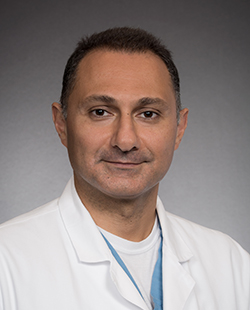Investigator Profile: Saman Arbabi, MD, MPH, FACS

Saman Arbabi, MD, MPH, FACS
Professor, Division of Trauma, Burn, and Critical Care Surgery Associate Member, Harborview Injury Prevention and Research Center
Increasing worldwide violence would predict a rise in the number of burn injuries. Dr. Arbabi’s group is investigating a novel topical therapy that is easy to apply and can be used by a wider range of health care providers. Our central hypothesis is that controlling the inflammatory signaling at the burn site prevents the release of inflammatory mediators and avoids the subsequent sequelae of thermal injury. We have identified p38 Mitogen Activated Protein Kinase (MAPK), an important inflammatory signaling pathway, as the therapeutic target. Previously, Dr. Arbabi’s group demonstrated that application of topical p38MAPK inhibitors on burn wounds attenuates the systemic inflammatory response, improves organ function, and preserves the local/systemic immunocompetence and ability to resist infections. They also demonstrated that topical p38MAPK inhibition is equally effective in partial or full-thickness burns. Over the next three years, they will investigate the role of p38MAPK signaling in wound healing and scar formation. The results of these studies will be critical to the implementation of a potential paradigm shift in the clinical treatment of challenging dermal injuries. The ultimate goal is to develop a highly effective safe topical treatment for patients with burn injuries and surgical wounds.
Dr. Arbabi is also active in surgical outcomes research at Harborview Injury Prevention and Research Center. Recently he has focused his interest on geriatric trauma. Geriatric trauma is a significant and growing public health concern. As the Baby Boomer generation reaches retirement, the percentage of the United States population that is elderly (65 years and older) will increase rapidly. Elderly trauma patients are less likely to go home or meet the criteria for admission to an inpatient rehab facility after discharge; therefore, the proportion of elderly trauma patients discharged to a skilled nursing facility (SNF) has increased dramatically over the last several years. Many physicians and health care workers that care for surgical patients think of SNF as a transitional phase for patients prior to returning home, but the increased mortality and re-admission to acute care hospitalization during this period challenges this assertion. Dr. Arbabi is one of the main investigators that has focused on post discharge rehabilitation of the surgical patients, especially patients discharged to SNF. In collaboration with Dr. Davidson and Dr. Flum, he has also established a multidisciplinary collaborative research group- Improving Nursing Facility Outcomes using Real-Time Metrics (INFORM)- combining researchers from Harborview Injury Prevention and Research Center and the Surgical Care and Outcomes Assessment Program.

